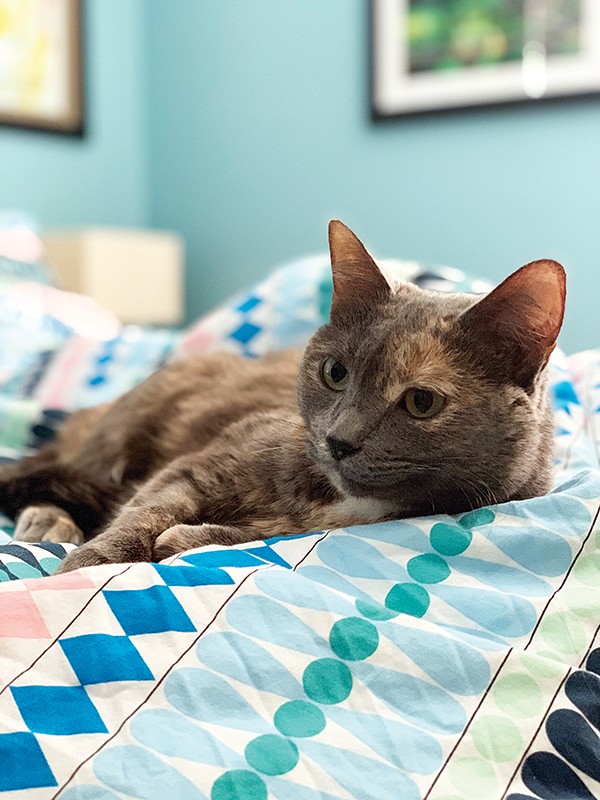Coco was a tortie with golden, owl-like eyes. At 11 months, she still hadn’t grown into her ears, pointy and perky like her personality. I was at the Memphis Humane Society to look at another cat that may well have been her litter-mate. She wasn’t interested. But Coco, then called Yaya, had something special. Of course, she wouldn’t replace our calico, who had passed suddenly four months prior, but she would fill the space she had left behind. I was pretty sure she’d get along with our other cat; this would prove to be an understatement.
I didn’t notice Coco was missing two toes on her front paw until a few months later, when I was trimming her claws. I wondered what misadventures and misfortunes befell her during her time on the streets, her life before rescue. I swore I’d give her the comfortable, pampered life a cat deserves. I’d keep her belly full, her bed soft, her scratching posts tall.
I noticed a lump on Coco’s hind leg in January, a few weeks before her estimated fourth birthday. I took her to the vet — it was big, that’s not normal, we need to operate, she said. She removed the tumor, the adjacent lymph node, and most of Coco’s leg. My resilient cat quickly adjusted to life as a “tripawd.” After a few days, she was escaping her makeshift recovery suite and right back to jumping on counters. We were optimistic we had saved her. I was convinced that fourth leg was just for looks because its absence didn’t slow my kitty down.
 Jen Clarke
Jen Clarke
Coco the golden-eyed tortie cat
About six months later, I opened Coco’s dinner and she didn’t come running. She had arthritis and an upper respiratory infection and tumors in her lungs. I spent the hardest month medicating, cuddling, spoon-feeding on my lunch break; every night I went to bed worrying that I was more committed to her life than she was. How would I know when it was time to let her go? Turns out, you just know. It was a Friday morning. I woke up and ran 10 teary miles to make sure I really thought it through. Sweating and sobbing, I called the vet to make an appointment. “She’s ready.”
I filled Coco’s last few hours with treats and chin scratches before I put her in the carrier with her blanket and favorite toy. I left the empty carrier in the car and went straight to bed, where I spent most of the weekend lonely and defeated. I had tried so hard.
Ten years ago, one of our candidates for city mayor would have found that hilarious, I guess. I try to imagine a context in which a stranger’s reaction to the pain of euthanizing a pet would inspire anything but empathy and pity — maybe she had a really ugly cry face? Still, no. It’s a hideous thing to say. I will never understand it. But 10 years seems like plenty of time to outgrow a bad attitude, so I can offer a little grace.
Experiences are like a playlist, a compilation of chart-toppers and experimental phases playing in the background whether we’re listening or tuned out. They matter, whether you validate them with a tweet or a TikTok or whatever. People forget this sometimes. That’s why I decided not to share anything about my cat’s passing on my Instagram or Facebook, opting instead to talk about her in person, the old-fashioned way, and only if I’m asked. Until right now, that is. It’s not that I welcome the discomfort of explaining to everyone who asks “How are your cats,” but because you can’t put it away, once it’s out there in pixels.
You have a public archive full of consequences. A bot will comment “Lovely!” in six months and bump a sad memory to the top of the feed, just as you were starting to get over it. Facebook in a year will show you what happened on this day because its algorithm sees all the likes and comments, but not the content. There’s an app called Timehop that curates everything you’ve posted on a certain date, to remind you how much fun you’ve had. Unfortunately, it also shows you how much you’ve evolved by reminding you how cringey your opinions once were. It doesn’t discern the moments you want to revisit from the ones you don’t. They’re all out there because you put them there. Whether you have public ambitions or are disinterested in reliving private pain, consider: Not everything is fit for publication.
Jen Clarke is a digital marketing specialist and an unapologetic Memphian.